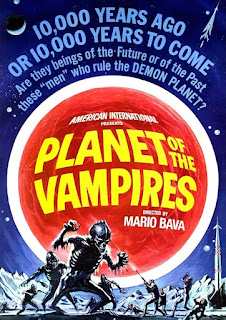The plot follows two spacecraft that respond to a mysterious distress signal on a remote, fog-enshrouded planet. After crash-landing, the surviving crew encounters strange phenomena, including the reanimation of their own dead comrades. What begins as a routine exploration turns into a nightmarish fight for survival, as the crew discovers they’re not alone—and that something ancient and malevolent is lurking just beneath the surface.
Bava, best known for his work in horror (Black Sunday, Blood and Black Lace), brings his painter’s eye to every frame. With creative lighting, color-saturated fog, and inventive set design, he conjures a palpably sinister atmosphere that rivals the most lavish studio productions. The film’s aesthetic—glossy leather space suits, pulsating alien landscapes, and stark, stylized lighting—feels like a fever dream from which you can't quite wake. It's no surprise that Gene Roddenberry’s Star Trek, which debuted just a year later, echoes this film's combination of cerebral sci-fi and space-bound suspense.
The performances are gloriously over-the-top, perfectly suited to the film’s pulpy tone. The characters emote with wild-eyed urgency, sometimes bordering on camp, yet never straying too far from the story’s emotional stakes. These theatrical performances heighten the unease and give the film its operatic edge.
Adapted from Renato Pestriniero’s short story One Night of 21 Hours, the film offers a chilling and original narrative that stands apart from many of its mid-century sci-fi peers. Unlike the raygun-heavy space adventures of the era, Planet of the Vampires leans into existential horror and psychological suspense, crafting a tale about possession, survival, and the thin veneer of human rationality when confronted with the unknown.
The special effects—while clearly limited by budget—are resourceful and often startlingly effective. Miniatures, optical tricks, and forced perspective give the illusion of vast alien environments. It’s a testament to Bava’s ingenuity that the film never feels cheap, only heightened and otherworldly.
It’s no wonder Planet of the Vampires has achieved cult status. With its surreal visuals, haunting tone, and prescient story, it feels like a precursor to so much of what came after in science fiction cinema. For die-hard sci-fi fans—and especially those fascinated by the genre’s darker, more philosophical corners—this film is essential viewing. Beneath its B-movie surface lies a visionary work that dared to ask not just what’s out there, but what happens when it turns its gaze back on us.
Wren Valentino

Comments
Post a Comment